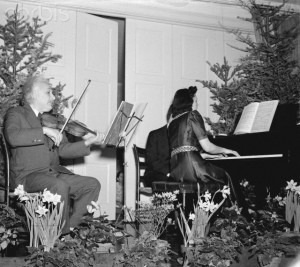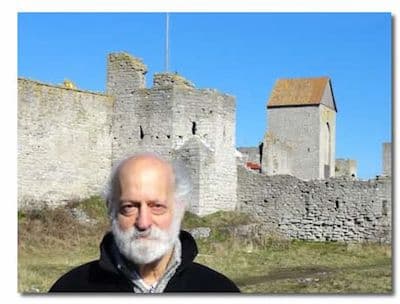
Albert Einstein and Gaby Casadesus
Giving Recital
We do all know that Einstein was an amateur violinist who loved playing Bach, Schubert and Beethoven. However, in his personal musical hierarchy, nobody could even come close to Mozart! In Mozart’s violin sonatas, Einstein saw the fulfillment of intuitive logic at its best. “The trouble,” according to Einstein, “is that really good music, whether from East or West, cannot be analyzed.” Einstein strongly emphasized the emotional aspect of music and preferred to remain ignorant on the internal logic. And we know that Einstein was a good enough violinist to play the Mozart sonatas with his friend the pianist Robert Casadesus. Keeping their discussions on physics, music, god and the world in mind,
Martinů set to work on a composition entitled Five Madrigal Stanzas H. 297. Dedicated to the physicist, Einstein and Casadesus eventually performed the work in a private recital.
Bohuslav Martinů: Five Madrigal Stanzas H. 297
Martinů had to make some concessions for Einstein’s amateur musical abilities. The violin part is technically unproblematic, and Martinů employed a limited harmonic vocabulary within a transparent conventional form. This formal clarity alongside an essentially diatonic musical language was almost certainly a concession to Einstein’s thoughts on music, and by extension, to his theoretical reasoning as well. The piano part, on the other hand, is considerably more difficult as Casadesus had a deserved reputation as a keyboard virtuoso. Martinů’s composition clearly addressed Einstein’s musical amateurism, and the scientist’s writings also peaked the composer’s interest in science.
Martinů wrote to a friend on 19 November 1946. “I continue to penetrate the field of modern physics. It is only a pity that the farther I get, the more you lose and the less I understand, but the more it arouses in me a curiosity and enthusiasm for my studies, for new knowledge and for things that would under other circumstances never have been received.” He copied and annotated various scientific texts ranging from Heinrich Wölfflin to Max Planck and Albert Einstein, but in the end he could never completely come to terms with The Theory of Relativity. Einstein was not particularly interested in Martinu’s scientific amateurism, yet their relationship remained on friendly and cordial terms. At the request of the composer, Einstein even sent a telegram to the communist functionary Klement Gottwald, asking him to pardon three men sentenced to death for subversive activities in Czechoslovakia. We don’t know if Einstein’s plea was successful.

